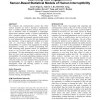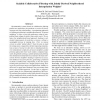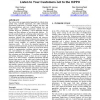1184 search results - page 222 / 237 » The importance of learning in fuzzy systems |
CONNECTION
2010
13 years 5 months ago
2010
Abstract. Despite the great amount of knowledge produced by the neuroscientific literature affective phenomena, current models tackling noncognitive aspects of behavior are often b...
CHI
2005
ACM
14 years 8 months ago
2005
ACM
The computer and communication systems that office workers currently use tend to interrupt at inappropriate times or unduly demand attention because they have no way to determine ...
ICDM
2007
IEEE
14 years 1 months ago
2007
IEEE
Recommender systems based on collaborative filtering predict user preferences for products or services by learning past user-item relationships. A predominant approach to collabo...
GROUP
2007
ACM
13 years 11 months ago
2007
ACM
The tension between privacy and awareness has been a persistent difficulty in distributed environments that support opportunistic and informal interaction. For example, many aware...
KDD
2007
ACM
14 years 8 months ago
2007
ACM
The web provides an unprecedented opportunity to evaluate ideas quickly using controlled experiments, also called randomized experiments (single-factor or factorial designs), A/B ...




